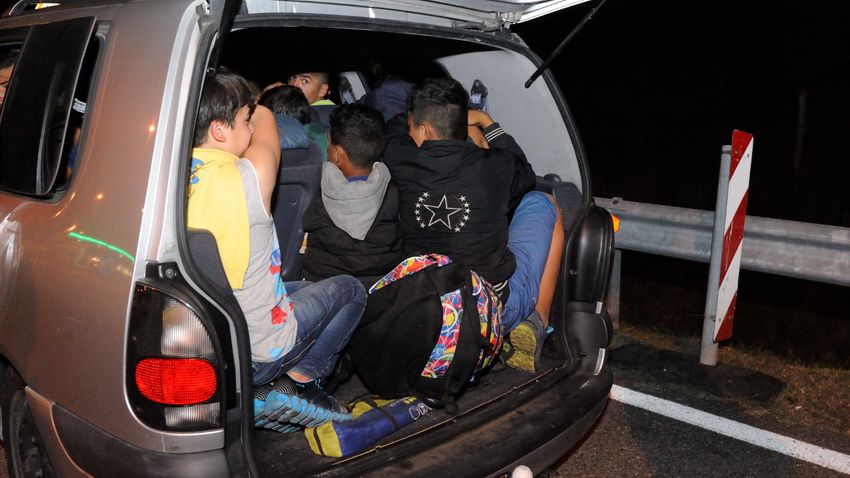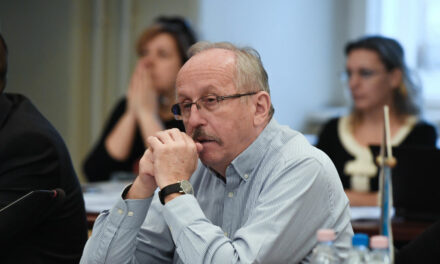In the current state, new ideas and their implementation are needed.
There is trouble and it is getting bigger. As Bence Rétvári, the Parliamentary State Secretary of the Ministry of the Interior, recently said on the M1 program,
two years ago, "only" 46,000 illegal immigrants were caught at the Hungarian border. Last year, this number increased to 122,000, and this year to more than 240,000. And with them, the number of people smugglers also increased.
Hungarian prisons currently hold 2,500 people-trafficking criminals, whose maintenance costs HUF 3-4 billion per year. And let's note that, in the meantime, we have received only 3-4 percent help from the Union for the protection of the national border, compared to our growing costs.
The big question is, how long can this go on? In particular, a week and a half ago, six human smugglers who claimed to be Iraqis shot at the policemen who were chasing them while fleeing by car.
According to press reports, they were ordered to use the weapons by the organizer of the action, and after their arrest and interrogation, according to the investigators, the people smugglers were able to collect approximately HUF 41 million from the 21 Syrian migrants.
We already wrote about one of the possibilities
You don't need to be an expert to determine that the sentences imposed on human traffickers, which have already been concluded and are legally binding, are quite mild. We found a very interesting table in the Prosecutors' page. According to this, between 2015 and 2017, the number of registered human trafficking crimes decreased from 650 to 179 (!), which is shockingly less than last year's approx. Based on 1,500 human traffickers.
It is quite sad that in those three years, 40 percent of the defendants in criminal proceedings for human trafficking, which ended with a final decision, were Hungarian, 24 percent were Serbian, and 7.7 percent were Romanian citizens. (These data may have changed between 2018 and 2022.)
Perhaps this can also explain why, even according to the Prosecutors' newspaper, the most typical was a prison sentence of between 2 and 4 years, and a prison sentence of 8 years was very rare.
It is true that a 2015 amendment to the law raised the limits of the prison sentence that can be imposed in the basic case of human trafficking from 1-5 years to 2-8 years. This can mean up to 5-10 years in prison in the case of being armed, armed or in a business-like manner, in a criminal association, and even if more than one of the above exists at the same time, the penalty can be increased to 5-15 years.
However, since, according to court practice, the punishments against human traffickers are currently not sufficiently deterrent, in our opinion, an urgent preventive step is needed.
Or the prison sentence should be increased to a minimum of 5 years (or even more) in the case of human trafficking, or tied to the number of migrants "transported" (since the smugglers' income also depends on it). Either way, the current state of affairs is unsustainable, as we have no other means of reducing migration in 2023 besides daily "complaining".
If and if this were to happen, the human traffickers would obviously raise the tariff, even double it. It is difficult to calculate how much fewer migrants could pay this increased "border crossing fee" (if it is their money at all...), but
the goal could be that people smugglers caught at the Hungarian border or within the country face the highest penalties in all of Europe in Hungary.
And if this were available, then perhaps the number of people imprisoned in Hungarian prisons would also decrease; it is true that their maintenance would cost more due to the higher penalty, but the migration pressure could be reduced. It's a matter of math and political decision.
This other means of deterring human traffickers could be the one that Great Britain and Denmark have been considering for illegal immigrants for some time, but have not yet applied it due to pressure from international liberal organizations. Yes, we are talking about deportation to Rwanda (more precisely, to Rwandan prisons), against which Ylva Johansson, the European Union's Home Affairs Commissioner, protested in the summer alongside human rights defenders. (Liz Truss spoke a few weeks ago that she would maintain the Rwandan solution and would even make similar agreements with more countries. The current Prime Minister who succeeded her has not commented on the matter so far.)
In our case, it would not necessarily be Rwanda, but any country with which it would be possible to agree on a "prison lease" within the framework of a financially reasonable agreement, and to which human traffickers would not even want to enter. (Fortunately, we have more and more friends even in the former Soviet successor states...)
With this idea, we should obviously wait until we receive all the money due to us from the Union. But there is no question that new ideas and their implementation are needed in the current state.
Featured image: Zoltán Gergely Kelemen












